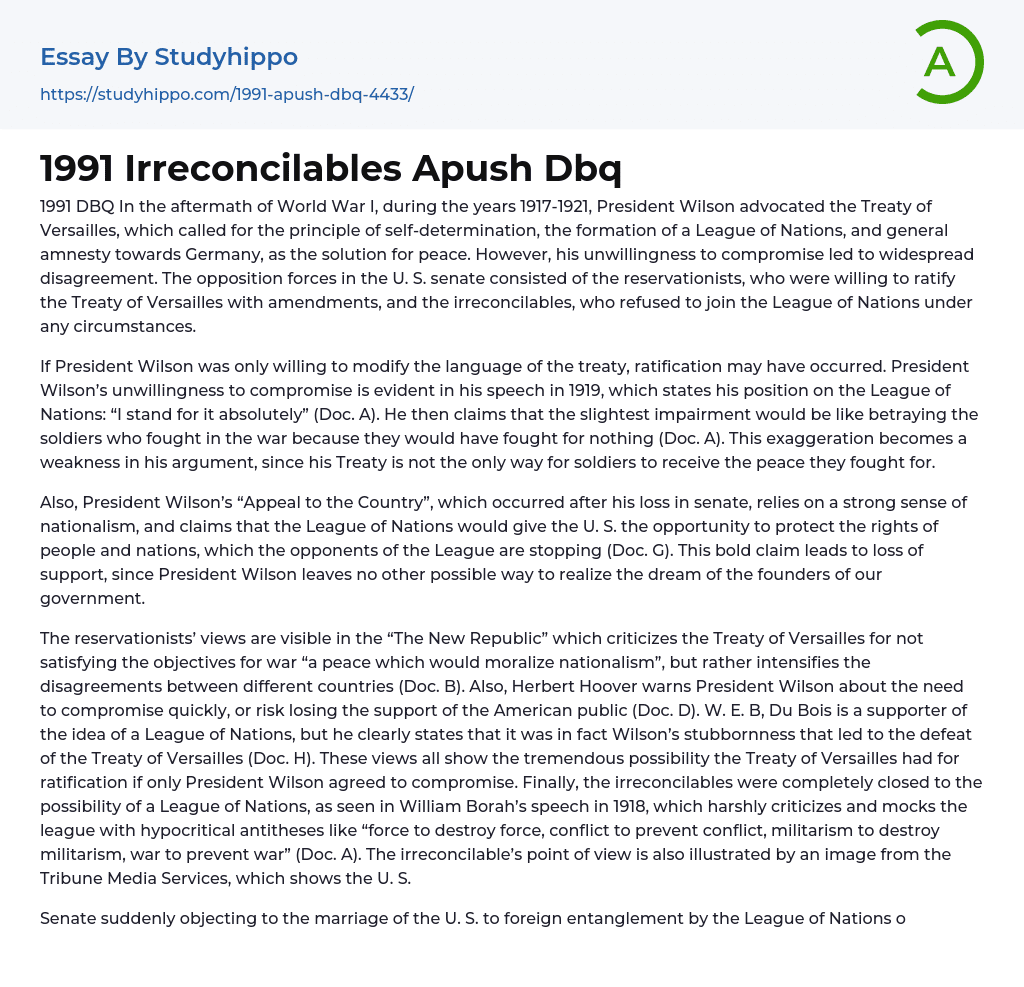1991 DBQ In the aftermath of World War I, during the years 1917-1921, President Wilson advocated the Treaty of Versailles, which called for the principle of self-determination, the formation of a League of Nations, and general amnesty towards Germany, as the solution for peace. However, his unwillingness to compromise led to widespread disagreement. The opposition forces in the U. S. senate consisted of the reservationists, who were willing to ratify the Treaty of Versailles with amendments, and the irreconcilables, who refused to join the League of Nations under any circumstances.
If President Wilson was only willing to modify the language of the treaty, ratification may have occurred. President Wilson’s unwillingness to compromise is evident in his speech in 1919, which states his position on the League of Nations: “I stand for it absolutely” (Do
...c. A). He then claims that the slightest impairment would be like betraying the soldiers who fought in the war because they would have fought for nothing (Doc. A). This exaggeration becomes a weakness in his argument, since his Treaty is not the only way for soldiers to receive the peace they fought for.
Also, President Wilson’s “Appeal to the Country”, which occurred after his loss in senate, relies on a strong sense of nationalism, and claims that the League of Nations would give the U. S. the opportunity to protect the rights of people and nations, which the opponents of the League are stopping (Doc. G). This bold claim leads to loss of support, since President Wilson leaves no other possible way to realize the dream of the founders of our government.
The reservationists’ views are visible in the “The New Republic” which criticize
the Treaty of Versailles for not satisfying the objectives for war “a peace which would moralize nationalism”, but rather intensifies the disagreements between different countries (Doc. B). Also, Herbert Hoover warns President Wilson about the need to compromise quickly, or risk losing the support of the American public (Doc. D). W. E. B, Du Bois is a supporter of the idea of a League of Nations, but he clearly states that it was in fact Wilson’s stubbornness that led to the defeat of the Treaty of Versailles (Doc. H). These views all show the tremendous possibility the Treaty of Versailles had for ratification if only President Wilson agreed to compromise. Finally, the irreconcilables were completely closed to the possibility of a League of Nations, as seen in William Borah’s speech in 1918, which harshly criticizes and mocks the league with hypocritical antitheses like “force to destroy force, conflict to prevent conflict, militarism to destroy militarism, war to prevent war” (Doc. A). The irreconcilable’s point of view is also illustrated by an image from the Tribune Media Services, which shows the U. S.
Senate suddenly objecting to the marriage of the U. S. to foreign entanglement by the League of Nations on the basis of constitutional rights (Doc. E). According to the senate, the U. S. would be losing the right to go to war along with collective security if they joined the League of Nations. The position of European nations, specifically France and Britain, was of hostility towards Germany for the mass casualties, causing an unwillingness to pardon them from the guilt-clause. The Treaty of Versailles had a great chance of being ratified if only President
Wilson would have been able to make small amendments.
The reservationists had a strong argument about the pros of a League of Nations, but they disagreed with Article 10, which gave the League’s council the U. S. government’s war powers. The irreconcilables on the other hand, gave the League of Nations no opportunity to make peace. If President Wilson had only agreed to put the world’s future over his selfish defense of his Treaty, the bitter nations of the Central Powers in addition to Russia and Japan, may have not resented the Treaty of Versailles as much, and World War II may have been prevented.
- Vice President essays
- Bill Clinton essays
- Theodore Roosevelt essays
- Thomas Jefferson essays
- Barack Obama essays
- Franklin D. Roosevelt essays
- George W. Bush essays
- Donald Trump essays
- James Madison essays
- Andrew Jackson essays
- George Washington essays
- John F. Kennedy essays
- Richard Nixon essays
- Abraham Lincoln essays
- Lyndon B. Johnson essays
- John Locke essays
- 9/11 essays
- A Good Teacher essays
- A Healthy Diet essays
- A Modest Proposal essays
- A&P essays
- Academic Achievement essays
- Achievement essays
- Achieving goals essays
- Admission essays
- Advantages And Disadvantages Of Internet essays
- Alcoholic drinks essays
- Ammonia essays
- Analytical essays
- Ancient Olympic Games essays
- APA essays
- Arabian Peninsula essays
- Argument essays
- Argumentative essays
- Art essays
- Atlantic Ocean essays
- Auto-ethnography essays
- Autobiography essays
- Ballad essays
- Batman essays
- Binge Eating essays
- Black Power Movement essays
- Blogger essays
- Body Mass Index essays
- Book I Want a Wife essays
- Boycott essays
- Breastfeeding essays
- Bulimia Nervosa essays
- Business essays
- Business Process essays




